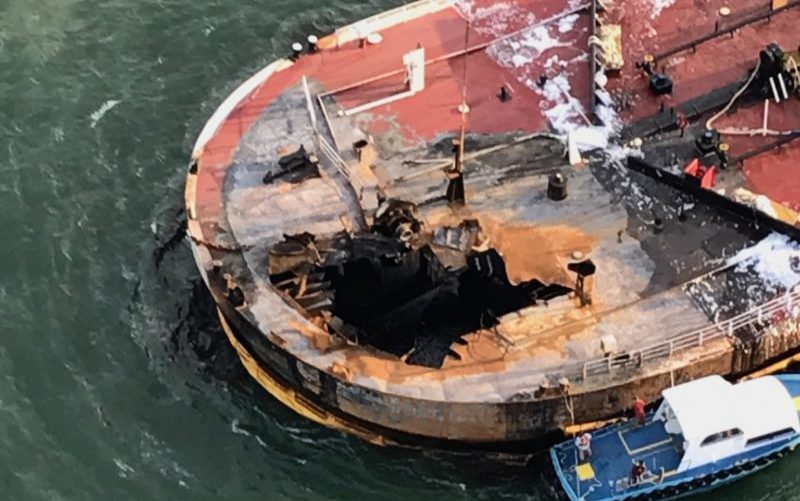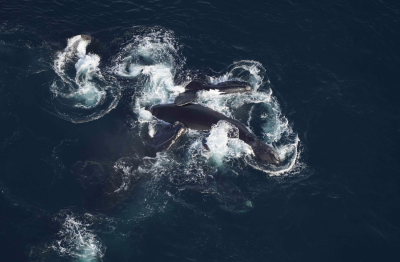Former Bouchard Transportation Co. employees described a corporate culture that made them fear for their jobs, during nine days of Coast Guard hearings into the October 2017 B. No. 255 barge explosion that killed two.
A Coast Guard and National Transportation Safety Board panel in Houston heard conflicting testimony about vapors that crewmembers detected inside the barge, and their assessments of how Bouchard handled reports of equipment dangers and near-accidents.
“It was told to me numerous times there were negative consequences to using stop-work authority…you would be laid off or terminated,” said Morgan Jackson, brother of victim Zachariah Jackson, and himself a former mate on a similar barge, B. No. 275.
A former captain of the B. No. 275 testified he was instructed by a company manager not to volunteer information when the Coast Guard boarded the barge at New Orleans to investigate a tip that vapors were a danger. The retired Coast Guard commander who led that inspection testified that he heard a crewman get an angry phone call from company president Morton Bouchard III as officers combed the vessel.

Firefighters extinguish the blaze on the barge B. No. 255 Oct. 20, 2017. Coast Guard photo.
The Melville, N.Y.-based company operated the ATB barges in the Gulf of Mexico petroleum trade. The B. No. 255, a 488’ oceangoing tank barge and its 127’x37’x20’, 6,140-hp tug Buster Bouchard, were getting underway from an anchorage off Port Aransas, Texas, with a cargo of crude oil when it blew up and burned around 4:30 a.m. on Oct. 20, 2017.
Zach Jackson, 28, of Salt Lake City, and crewmate Du’Jour Vanterpool, 26, of Houston were killed. In the first day of testimony in July 16, former tug first mate Lonnie Roberts described seeing blue flames surge over the barge deck seconds before the explosion.
Much of the hearings focused on vapor leaks on both the B. No. 255 and B. No. 275. On the ninth and final day of testimony July 26, Morgan Jackson told Coast Guard investigators how in May 2017 he was nearly overcome by fumes in the aft peak of B. No. 275.
Jackson said he was barely able to climb out, and was incapacitated for two hours. When he recovered, the crew checked the space with a multigas meter and found a lower explosive limit of 82%, indicating a danger of explosion or fire.
“There was a diesel transfer pump down there they’d been having issues with,” Jackson recalled. But the odor in the compartment was much stronger than fuel, he said.
Jackson recounted being in the galley as the barge captain called the Bouchard dispatch office to report the problem, and was connected to Jon Shaw, Bouchard’s former manager of maintenance and repair.
On speakerphone, Jackson heard the conversation as the captain opened with, “Hey, we’ve got a hot void.”
“Now is not a good time,” Shaw replied, said Jackson. The manager suggested blowing down the compartment with a fan, and then finding the potential leak and fixing it with resin, said Jackson.
Within a couple of days the captain was able to re-enter the space, but could not find a leak, and called Shaw to report, said Jackson.
“He was upset,” Jackson said of Shaw. “He said, ‘How do you know there’s a leak if you can’t find it?’”
Former B. No. 275 captain Adam Cowart testified the vapor problem recurred through summer into fall 2017. He learned of the issue when he came back on board in July, and by October it smelled “almost like you popped the lid on a cargo tank,” he said.
On a trip to Port Everglades, Fla., to pick up a cargo, “we were empty (of oil) and it was real bad,” said Cowart. Via satellite phone he talked to Shaw, who again suggested ventilating the space with a fan.
“I said we needed to get it repaired,” said Cowart, who thought the trip was close enough to Tampa to stop and get the work done. But at Port Everglades he was directed to load the barge.
Cowart said he continued to ventilate the space over the next weeks: “I just kept the fan there and plugged it in.” On a following trip, the B. No. 275 loaded at Corpus Christi, Texas, and headed for New Orleans.
Cowart said Shaw advised him twice that the barge might get boarded by the Coast Guard, and instructed him “not to volunteer any information” to officers.
Recently retired Coast Guard Cmdr. James Bigbe, former chief of prevention for Sector New Orleans prevention, recounted how a whistleblower tip alerted one of his officers to vapors on the B. No. 275, which was directed to an anchorage for inspection.
The team got a Bouchard tankerman to sample a forward void with a multigas meter, Bigbe said, and he discussed past readings with the crewman.
Then the tankerman answered a call on his cell phone with “someone yelling at him,” Bigbe said. The crewman said, “No sir, I did not know I could prevent them from boarding the vessel,” according to Bigbe, who said he learned the caller was company president and CEO Morton Bouchard III.
In his testimony, former barge captain Cowart said he stuck to the instructions he had gotten from safety director Shaw during the inspection.
“Jon told me not to volunteer any information,” said Cowart. The inspection team did not find the problematic compartment “because we didn’t tell them,” he said.
A hearing officer referenced barge logbook entries, including a line where it appeared previous lower explosive level readings had been scratched out.
“That was part of not volunteering the information,” Cowart replied.





